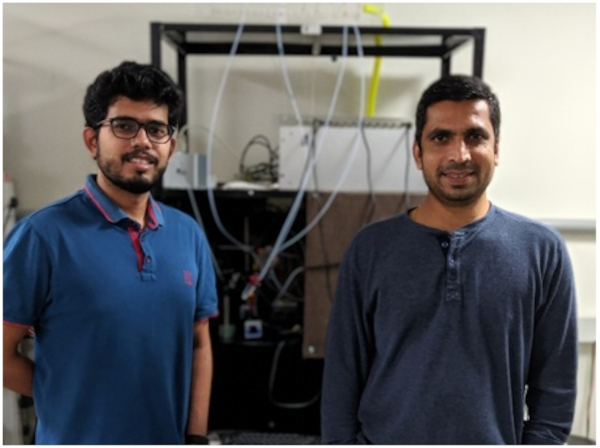According to recent data released by the Ministry of Health and Family Welfare, Govt. of India, around 80% of cases of coronavirus are asymptomatic. These are those cases that do not show any symptom, but they certainly can spread the virus. It is difficult to spot these cases. It has been seen in many cases that complete loss of smell (anosmia) is an indicator.
Taking a clue from this, researchers from the Indian Institute of Science Education and Research, Pune (IISER Pune) in collaboration with the BJ Medical College have developed a fast and sensitive device that can help detect asymptomatic COVID-19 patients by testing their sense of smell. By accurately measuring the ability to smell, one could detect an asymptomatic COVID-19 infection caused by SARS-CoV-2 virus.
The team has designed and custom-built an olfactory-action meter, that can determine with precision how well one can smell. “Our instrument offers many advantages over the existing clinical methods for assessing olfaction. It delivers odours in a controlled fashion, assesses the olfactory health status in less than 20 minutes of testing, and can innocuously quantify deficits under infective conditions as it has built-in safety precautions to prevent cross-contamination,” says Dr. Nixon Abraham, Assistant Professor, IISER, Pune.
For this study, the team used odorous substances of varying physico-chemical properties that allowed them to collect more than 3600 readouts from 71 people, including normal healthy people and asymptomatic COVID-19 patients.
Through this method of screening, the team analysed detection indices at varying odour concentrations as well as olfactory matching abilities across various odours. “This allowed us to generate an olfactory function score, which was unique to each individual tested”, says Anindya Bhattacharjee, who along with Dr Abraham, made these measurements at the BJ Medical College during the COVID-19 lockdown in May this year.
Anindya Bhattacharjee (R) with Dr Nixon Abraham (L)
Researchers from the Indian Institute of Science Education and Research, Pune (IISER Pune) in collaboration with the BJ Medical College have developed a fast and sensitive device that can help detect asymptomatic COVID-19 patients by testing their sense of smell.
The team optimised the experimental parameters by first testing normal healthy people. They then assessed olfaction in asymptomatic COVID-19 patients admitted in the hospital. The method optimised by the team identified olfactory dysfunction in 82% of asymptomatic COVID-19 carriers. In comparison, only 15% of the same set of patients reported a loss of olfaction in self-reporting paradigms.
Using this method, the team says that they can analyse both sensory (pertaining to sensory neurons in the nose) and cognitive aspects (problems at the central nervous system, beyond the nose) of olfaction. “As neuroinvasive properties of SARS-CoV-2 are not known very well, obtaining readouts reflecting the cognitive abilities would be very useful and we are collecting this data right now,” he added.
Speaking on the potential applications of the study, Dr Abraham said that the study has laid the necessary groundwork to consider olfactory fitness as one of the prime criteria to identify COVID-19 asymptomatic carriers. “The methods and parameters established by our study can potentially be translated into a sensitive, fast and economical olfaction-based screening assay that can be self-administered by large populations,” said Dr Abraham.
This research received funding from the Wellcome Trust – DBT India Alliance.
The research team includes Anindya S. Bhattacharjee and Dr. Nixon Abraham from IISER Pune and Samir V. Joshi, Shilpa Naik and Shashikala Sangle from BJ Medical College. The research findings have been published in the Lancet’s EClinicalMedicine.
Source: Vigyan Prasar
You may also like
-
New Heat-Based Approach To Cancer Treatment Can Reduce Chemotherapy Doses
-
Scientists Take A Major Step Towards Unification Of Classical & Quantum Gravity
-
India Graphene Engineering and Innovation Centre (IGEIC) Under the Vision of Viksit Bharat@2047 Launched
-
New High-Performance Gas Sensor can Monitor Low Level Nitrogen Oxides Pollution
-
Antidepressant Drug can be Repurposed for Treating Breast Cancer
